Financial System Adaptability and Resilience
Financial systems differ across countries and tend to evolve slowly over time. Their structure is typically stable, but their resilience is often tested. A well-functioning financial system is vital for economic development, as it ensures that capital flows to the most productive and valuable investment opportunities. However, systemic vulnerabilities can have far-reaching consequences. For example, the 2007–08 global financial crisis emerged from within the financial sector itself when complex financial products fuelled a credit bubble in the U.S. housing market, threatening global economic stability when the bubble burst. That event led to extensive policy and regulatory reforms to strengthen financial system resilience.
Financial systems continue to face significant challenges. External shocks like the COVID-19 pandemic, the climate crisis, the green economic transition, and the energy crisis driven by geopolitical conflict all underscore the importance of financial systems that can absorb shocks and adapt to changing economic conditions. Motivated by these pressing issues, we investigate how financial systems respond to crises, which institutions and policies improve resilience, and the role of finance systems' setup in broader economic transformations. We use diverse data sources, including bank and firm-level data, regulatory reports, and house price and election data, to inform evidence-based policy.
Research Cluster
Financial Resilience and RegulationYour contact

- Department Financial Markets
EXTERNAL FUNDING
08.2022 ‐ 07.2025
OVERHANG: Debt overhang and green investments - the role of banks in climate-friendly management of emission-intensive fixed assets
The collaborative project “Debt Overhang and Green Investments” (OVERHANG) aims to investigate the role of banks in the climate-friendly management of emission-intensive fixed assets. This will identify policy-relevant insights on financial regulation, government-controlled lending and financial stability, as well as raise awareness among indebted stakeholders.
01.2015 ‐ 12.2019
Interactions between Bank-specific Risk and Macroeconomic Performance
07.2016 ‐ 12.2018
Relationship Lenders and Unorthodox Monetary Policy: Investment, Employment, and Resource Reallocation Effects
Leibniz Association
We combine a number of unique and proprietary data sources to measure the impact of relationship lenders and unconventional monetary policy during and after the European sovereign debt crisis on the real economy. Establishing systematic links between different research data centers (Forschungsdatenzentren, FDZ) and central banks with detailed micro-level information on both financial and real activity is the stand-alone proposition of our proposal. The main objective is to permit the identification of causal effects, or their absence, regarding which policies were conducive to mitigate financial shocks and stimulate real economic activities, such as employment, investment, or the closure of plants.
Refereed Publications
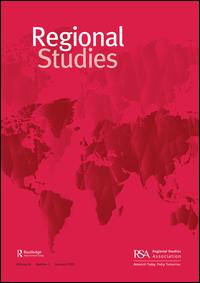
Social Capital and Regional Innovation: Evidence from Private Firms in the US
in: Regional Studies, No. 1, 2023
Abstract
In this study we investigate whether and to what extent social capital may affect regional innovation by focusing on private firms in the United States. We document that regional social capital is positively associated with the quantity, quality and novelty of county-level innovation by private firms. In addition, we find that the positive relation between social capital and regional innovation is more prominent in counties with a lower supply of financial capital. We also report that social capital is complementary to investments in research and development to produce inventive outcomes in local areas. Using a spatial Durbin model, we provide evidence that regional social capital has significant spillover effects in boosting the innovation activities of neighbouring counties.
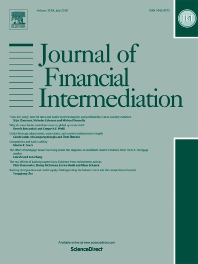
The Disciplining Effect of Supervisory Scrutiny in the EU-wide Stress Test
in: Journal of Financial Intermediation, January 2023
Abstract
Relying on confidential supervisory data related to the 2016 EU-wide stress test, this paper presents novel empirical evidence that supervisory scrutiny associated to stress testing has a disciplining effect on bank risk. We find that banks that participated in the 2016 EU-wide stress test subsequently reduced their credit risk relative to banks that were not part of this exercise. Relying on new metrics for supervisory scrutiny that measure the quantity, potential impact, and duration of interactions between banks and supervisors during the stress test, we find that the disciplining effect is stronger for banks subject to more intrusive supervisory scrutiny during the exercise. We also find that a strong risk management culture is a prerequisite for the supervisory scrutiny to be effective. Finally, we show that a similar disciplining effect is not exerted neither by higher capital charges nor by more transparency and related market discipline induced by the stress test.

Corporate Culture and Firm Value: Evidence from Crisis
in: Journal of Banking and Finance, January 2023
Abstract
Based on the Competing Values Framework (CVF), we score 10-K text to measure company culture in four types (collaborative, controlling, competitive, and creative) and examine its role in firm stability. We find that firms with higher controlling culture fared significantly better during the 2008–09 crisis. Firms with stronger controlling culture experienced fewer layoffs, less negative asset growth, greater debt issuance, and increased access to credit-line facilities during the crisis. The positive effect of the controlling culture is stronger among the financially-constrained firms. Overall, the controlling culture improves firm stability through greater support from capital providers.
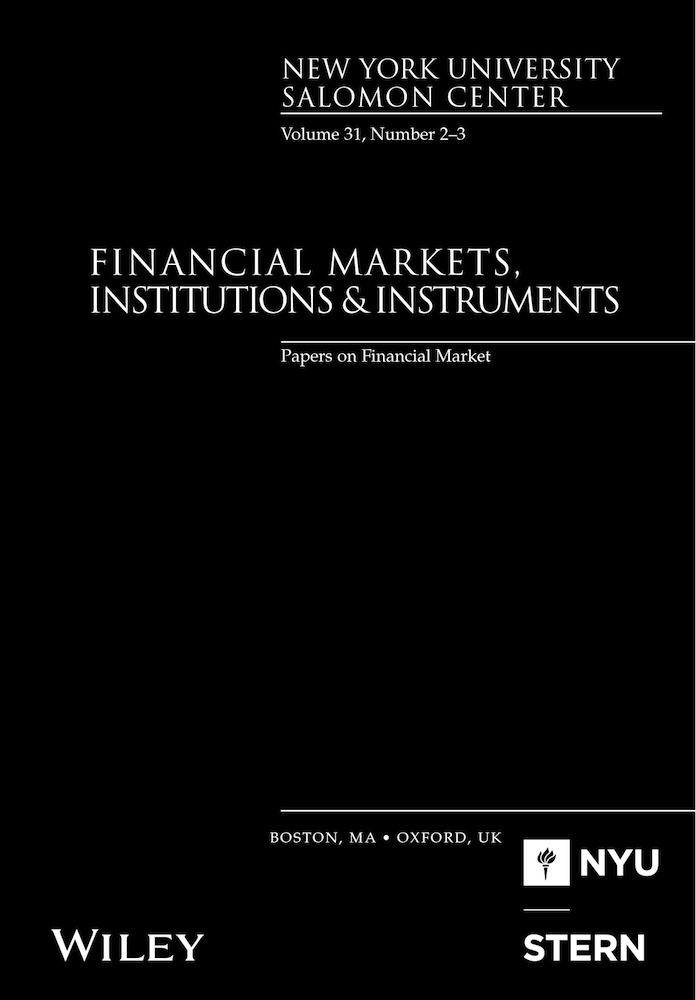
Environmental Reputational Risk, Negative Media Attention and Financial Performance
in: Financial Markets, Institutions and Instruments, No. 4, 2022
Abstract
Tracing negative media attention, this paper investigates the effect of reputational risk on firm value. Decomposing reputational damage into environmental, social and corporate-governance dimensions, it reports that environmental reputational risk has the most significant negative effect on price earnings, i.e., firms exposed to environmental risk are likely to be priced at a discount or charged a higher risk premium when discounting future earnings.

The Impact of Financial Transaction Taxes on Stock Markets: Short-Run Effects, Long-Run Effects, and Reallocation of Trading Activity
in: National Tax Journal, No. 3, 2022
Abstract
We investigate the French 2012 financial transaction tax (FTT) and find robust evidence for anticipation effects before the implementation date. Controlling for short-run effects, we only find weak evidence for a long-run reduction in trading activity. Thus, the main impact of the French FTT on trading activity is short-run. In line with liquidity clientele effects, we find a more potent effect for low-liquidity stocks and a reallocation of trading to high-liquidity stocks from the Supplemental Liquidity Provider (SLP) program. Finally, we find weak evidence for a persistent volatility reduction but no indication of a significant FTT impact on price efficiency.
Working Papers
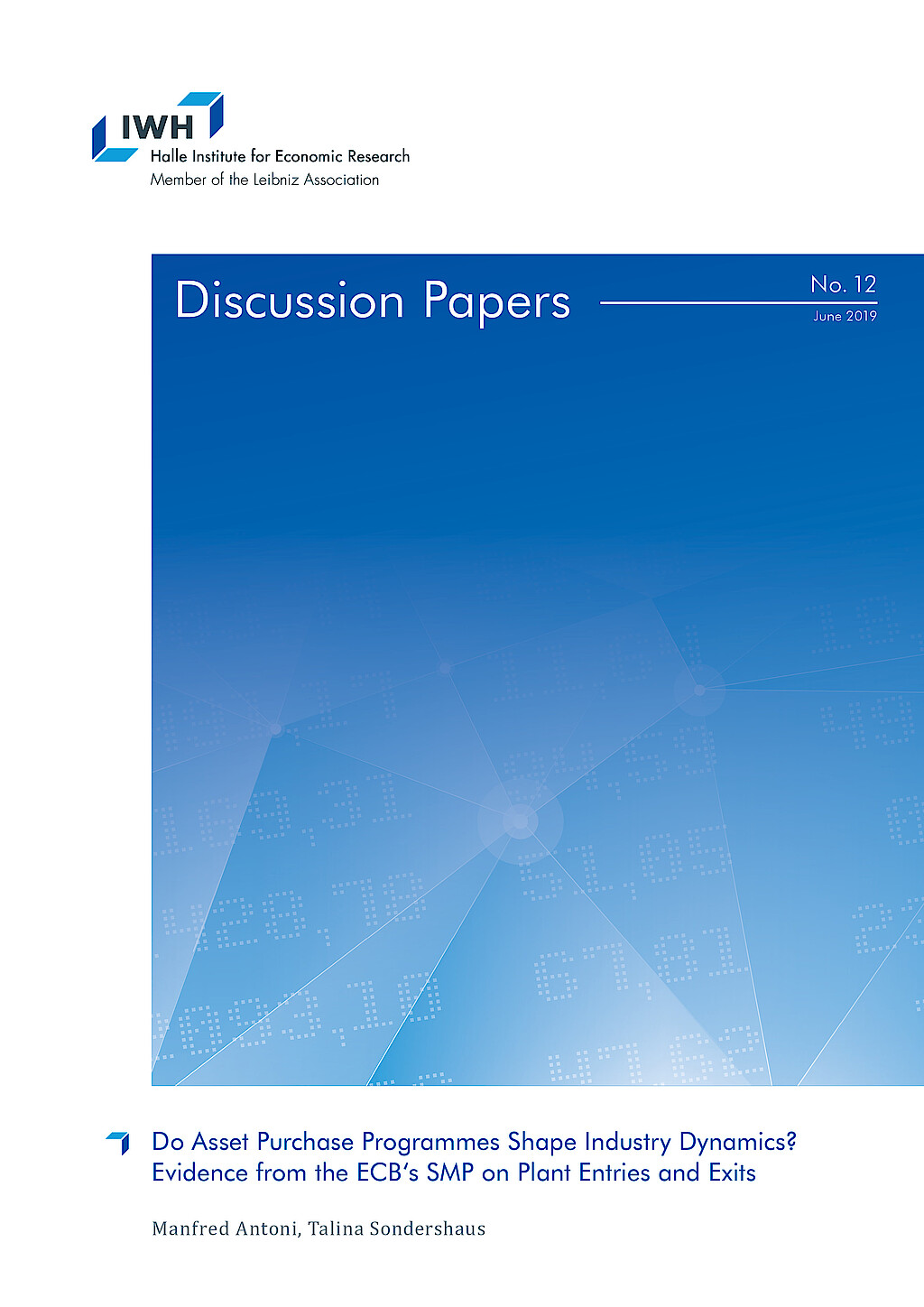
Do Asset Purchase Programmes Shape Industry Dynamics? Evidence from the ECB's SMP on Plant Entries and Exits
in: IWH Discussion Papers, No. 12, 2019
Abstract
Asset purchase programmes (APPs) may insulate banks from having to terminate relationships with unproductive customers. Using administrative plant and bank data, we test whether APPs impinge on industry dynamics in terms of plant entry and exit. Plants in Germany connected to banks with access to an APP are approximately 20% less likely to exit. In particular, unproductive plants connected to weak banks with APP access are less likely to close. Aggregate entry and exit rates in regional markets with high APP exposures are also lower. Thus, APPs seem to subdue Schumpeterian cleansing mechanisms, which may hamper factor reallocation and aggregate productivity growth.
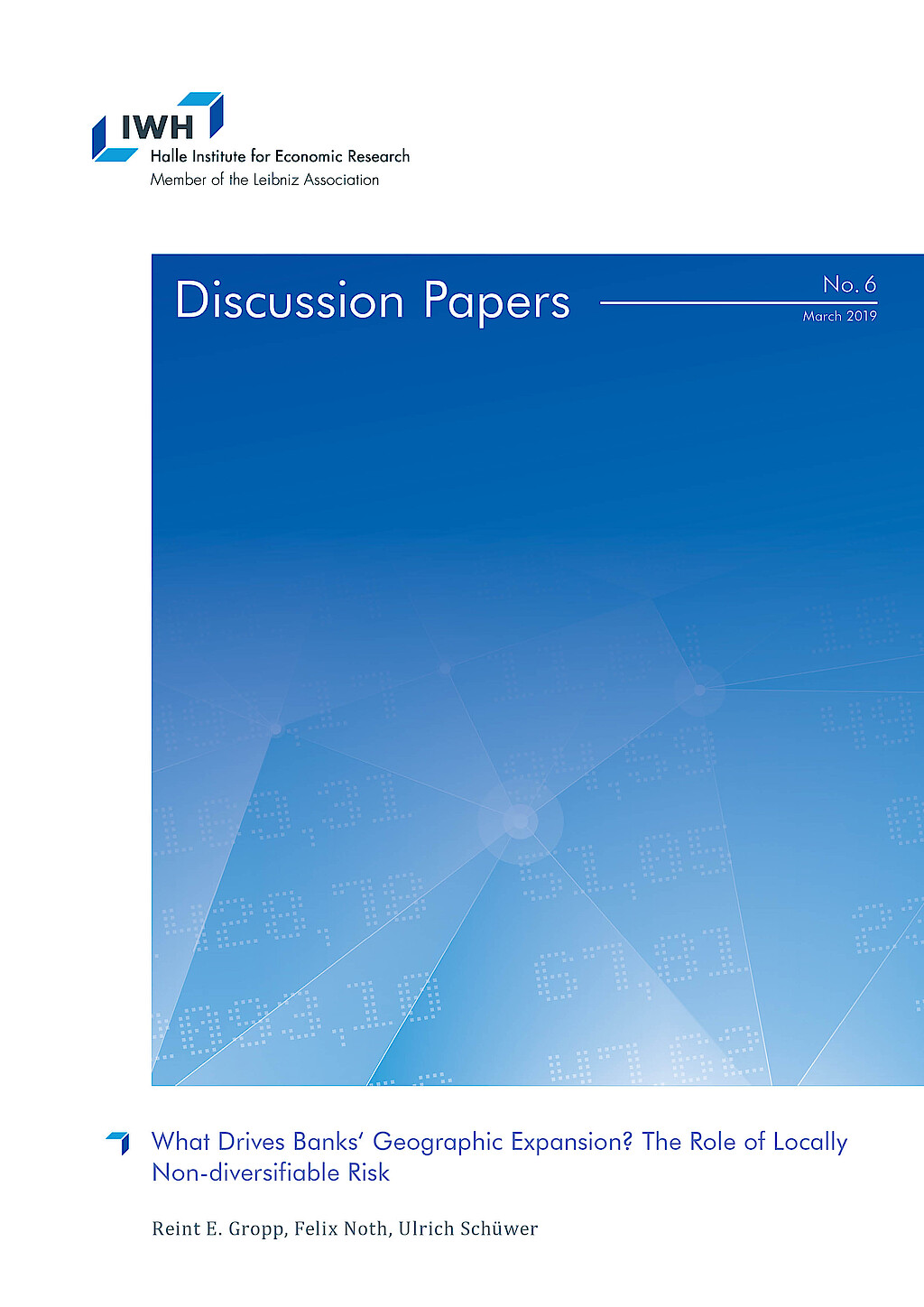
What Drives Banks‘ Geographic Expansion? The Role of Locally Non-diversifiable Risk
in: IWH Discussion Papers, No. 6, 2019
Abstract
We show that banks that are facing relatively high locally non-diversifiable risks in their home region expand more across states than banks that do not face such risks following branching deregulation in the 1990s and 2000s. These banks with high locally non-diversifiable risks also benefit relatively more from deregulation in terms of higher bank stability. Further, these banks expand more into counties where risks are relatively high and positively correlated with risks in their home region, suggesting that they do not only diversify but also build on their expertise in local risks when they expand into new regions.
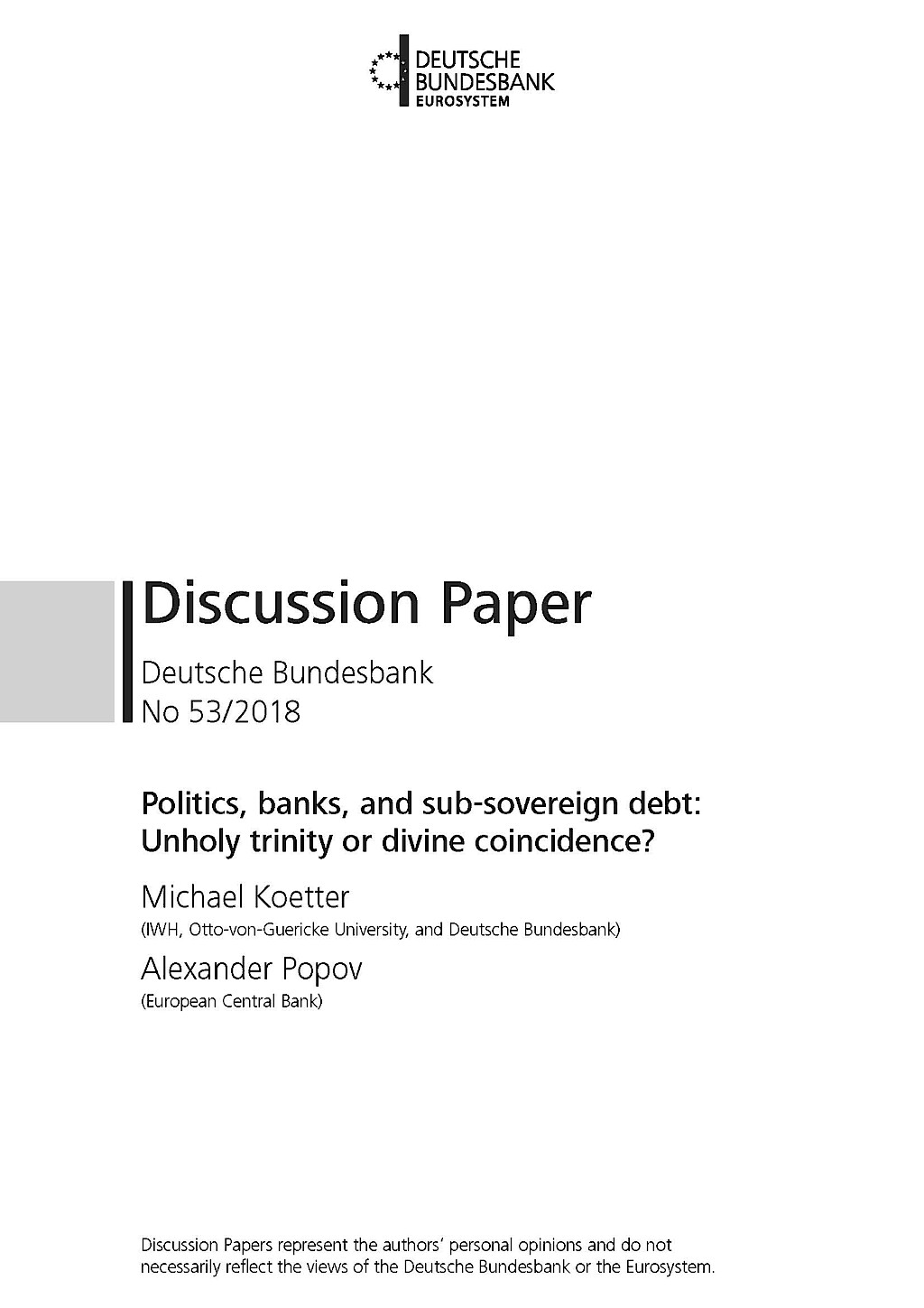
Politics, Banks, and Sub-sovereign Debt: Unholy Trinity or Divine Coincidence?
in: Deutsche Bundesbank Discussion Paper, No. 53, 2018
Abstract
We exploit election-driven turnover in State and local governments in Germany to study how banks adjust their securities portfolios in response to the loss of political connections. We find that local savings banks, which are owned by their host county and supervised by local politicians, increase significantly their holdings of home-State sovereign bonds when the local government and the State government are dominated by different political parties. Banks' holdings of other securities, like federal bonds, bonds issued by other States, or stocks, are not affected by election outcomes. We argue that banks use sub-sovereign bond purchases to gain access to politically distant government authorities.
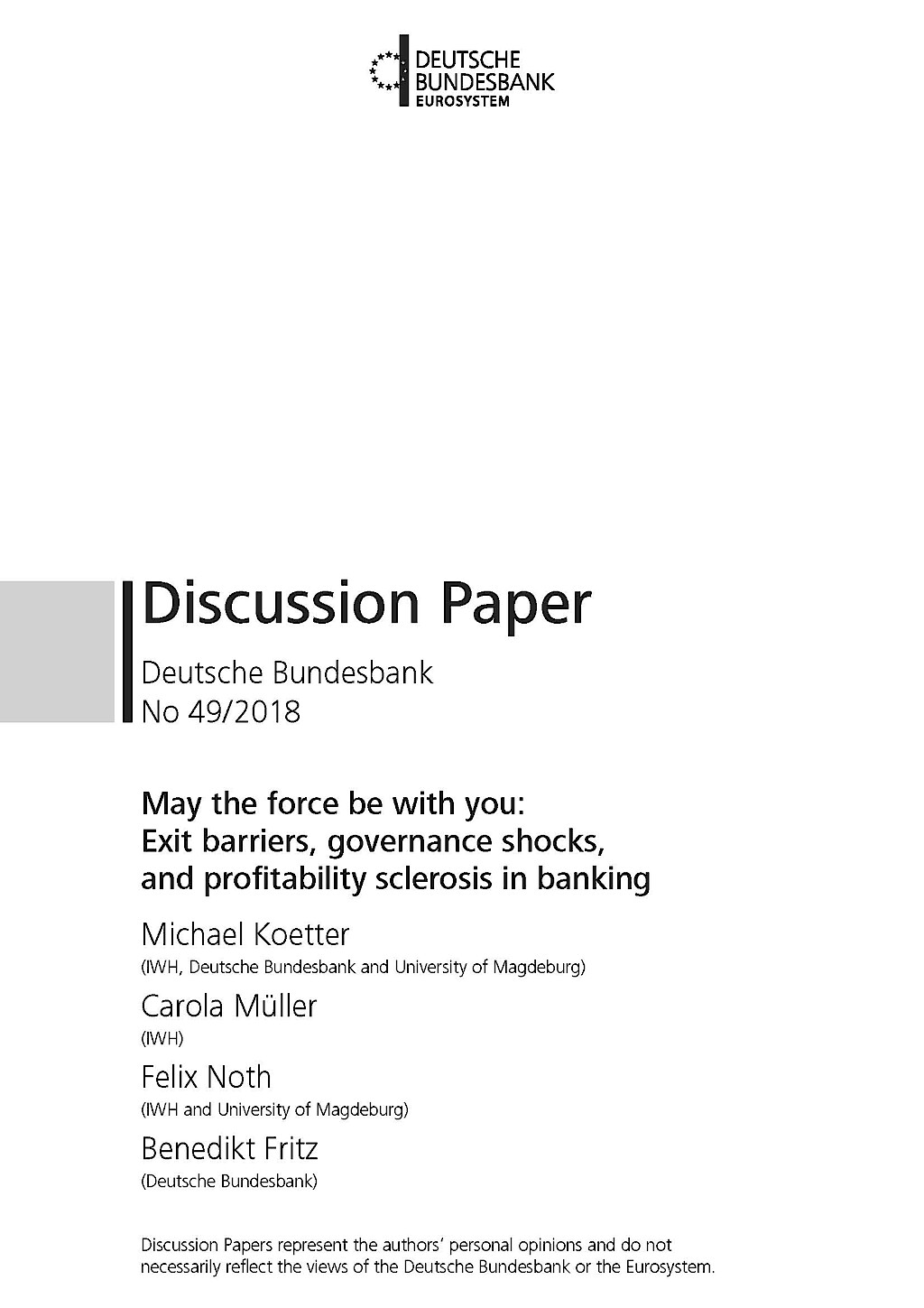
May the Force Be with You: Exit Barriers, Governance Shocks, and Profitability Sclerosis in Banking
in: Deutsche Bundesbank Discussion Paper, No. 49, 2018
Abstract
We test whether limited market discipline imposes exit barriers and poor profitability in banking. We exploit an exogenous shock to the governance of government-owned banks: the unification of counties. County mergers lead to enforced government-owned bank mergers. We compare forced to voluntary bank exits and show that the former cause better bank profitability and efficiency at the expense of riskier financial profiles. Regarding real effects, firms exposed to forced bank mergers borrow more at lower cost, increase investment, and exhibit higher employment. Thus, reduced exit frictions in banking seem to unleash the economic potential of both banks and firms.
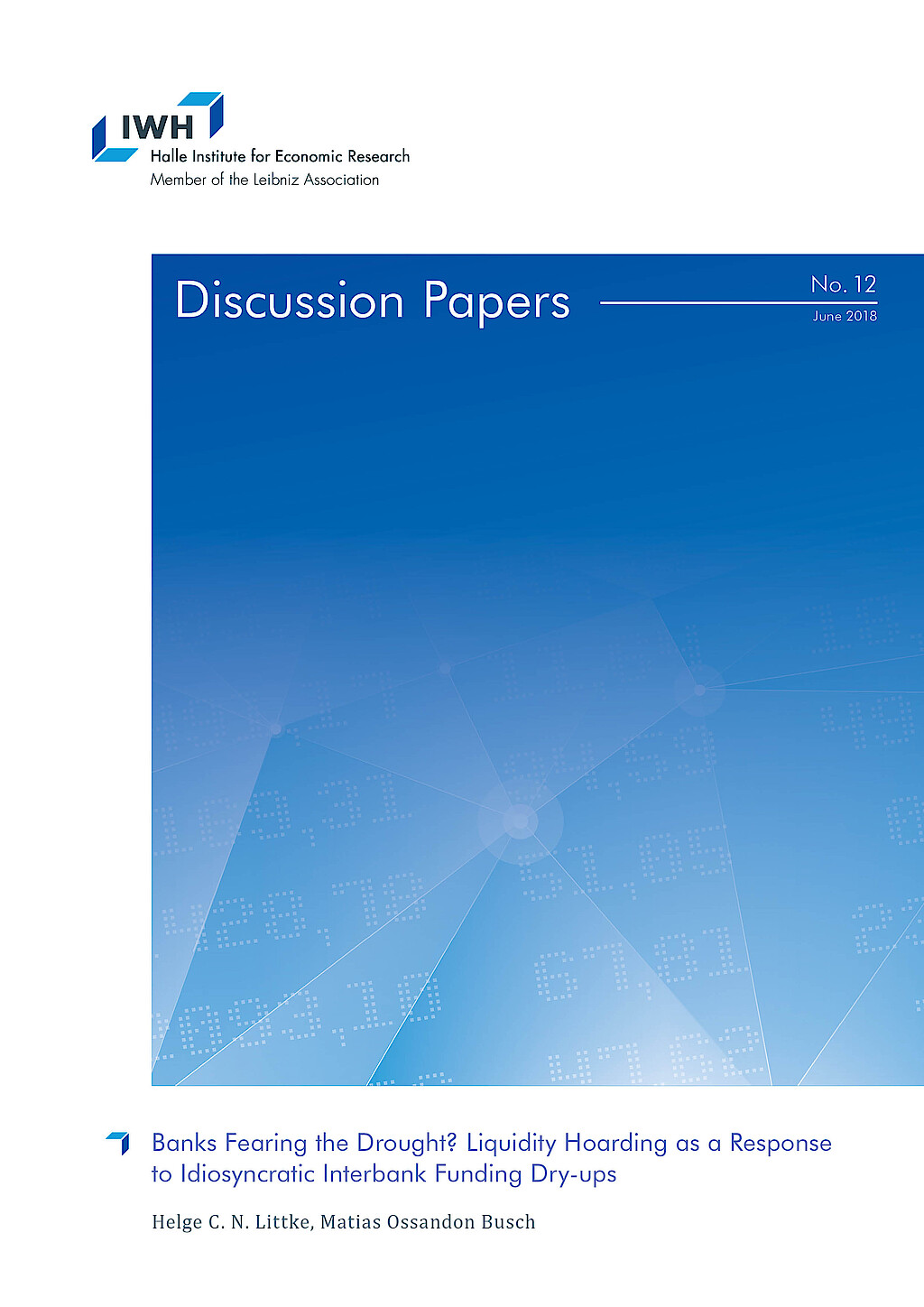
Banks Fearing the Drought? Liquidity Hoarding as a Response to Idiosyncratic Interbank Funding Dry-ups
in: IWH Discussion Papers, No. 12, 2018
Abstract
Since the global financial crisis, economic literature has highlighted banks’ inclination to bolster up their liquid asset positions once the aggregate interbank funding market experiences a dry-up. To this regard, we show that liquidity hoarding and its detrimental effects on credit can also be triggered by idiosyncratic, i.e. bankspecific, interbank funding shocks with implications for monetary policy. Combining a unique data set of the Brazilian banking sector with a novel identification strategy enables us to overcome previous limitations for studying this phenomenon as a bankspecific event. This strategy further helps us to analyse how disruptions in the bank headquarters’ interbank market can lead to liquidity and lending adjustments at the regional bank branch level. From the perspective of the policy maker, understanding this market-to-market spillover effect is important as local bank branch markets are characterised by market concentration and relationship lending.



















